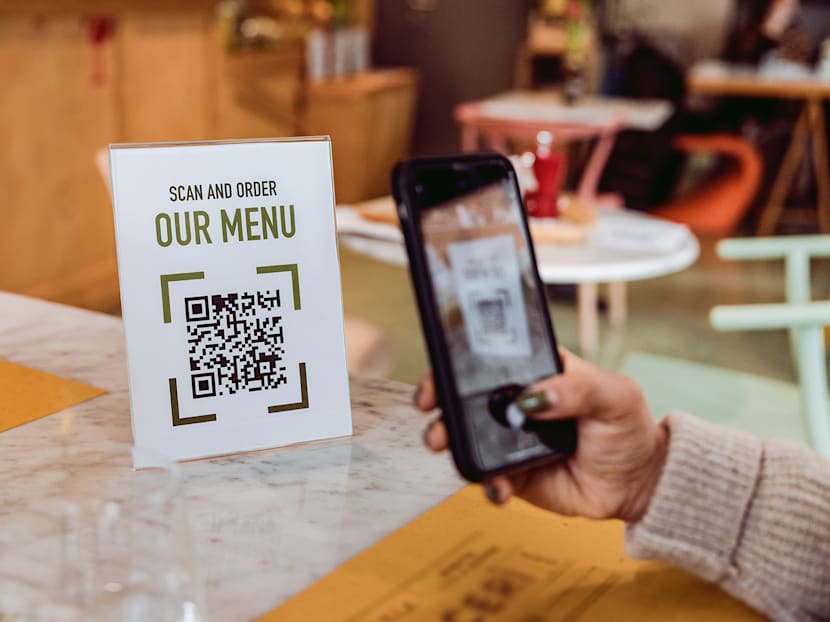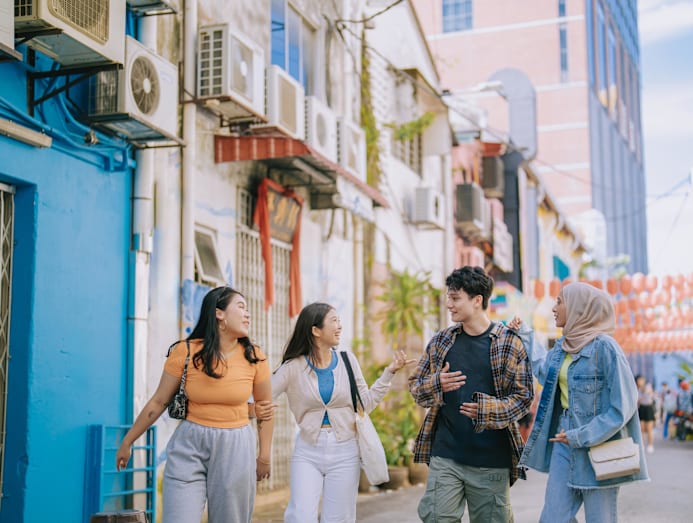When a QR code replaced my regular prata guy – and what we lose in our overly convenient modern lives
Modern life has never been more convenient, but with every QR code, chatbot, and delivery app, we lose the human interactions that make our days meaningful. Here's why CNA Lifestyle’s Izza Haziqah believes small inconveniences can enrich our lives, and why we must embrace them.

QR codes may make things seem easy and faster, but this writer argues it takes away the chance to interact with the people around her. (Photo: iStock)

This audio is generated by an AI tool.
When I went to my favourite prata shop the other day, I had a small shock. The laminated menus were gone. In their place, a QR code taped to the table.
Scan to order. Pay online. Collect at the counter. No need to speak to anyone.
Some say it’s efficient and faster (arguably). But it also meant my husband and I no longer get to talk to the waiters – the “abangs" (or brothers) and “bosses” we’ve greeted for years. They’ve seen us through milestones that even some friends haven’t: Before we were married, when I was pregnant, when we showed up bleary-eyed with our newborn, and now with a toddler in tow.
They may not know our names, but they know us: Our usual orders, our rituals, our banter about football. But now, they’re no longer out on the floor taking orders. They’ve been moved to the counter or the kitchen, handling logistics instead.
And with that simple shift, the invisible thread of connection is gone.
It might sound trivial. It’s just ordering food, right?
But moments like these say something bigger about the world we’re building – one where “faster” and “cheaper” replace “warmer” and “friendlier”. And when we prioritise all that in the name of convenience, we risk eroding the human interactions that make life meaningful.
THE QUESTIONABLE PROMISES OF SAVING TIME
We live in the most convenient age in human history. We press a few buttons on the device in our hands, and a meal or a bag of groceries arrives at the door. Tap a few more, and a car appears. Some of us don’t even press anything. Speak, and our device obeys.

Even when we still have to leave the house, everything is sped up. Lines are shorter, payments are quicker, and friction – that pesky drag of everyday life – is ironed out for us.
This is, without question, life-changing for many. People with disabilities, single parents juggling multiple responsibilities, and the time-strapped caregiver – for them, convenience can be a lifeline.
But for some of us, while we tell ourselves that convenience “saves time”, it doesn’t always feel like we have more of it.
I fall for this a lot. I tell myself, if I just make everything quicker, I’ll finally have space to rest or connect.
Yet, the space never comes. I end up filling the gaps with more work, more errands, more scrolling on my phone. And even with “more time”, I don’t always feel closer to the people around me. In fact, I’m more distant.
LONELINESS AS THE PRICE OF CONVENIENCE
Every QR code that replaces a waiter, every chatbot that replaces a receptionist, every vending machine that churns out lunches instead of a cook – all of these make life more “efficient.” But they can also take away the spontaneous interactions that colour our days.
The COVID-19 pandemic made this even starker. It was a time of remarkable innovation. We had virtual classrooms, entire offices running from our bedrooms, even concerts were broadcast remotely. Technology made it possible to live almost entirely indoors, without ever facing another person.
The irony, however, is that the more frictionless life became, the lonelier and unhappier many felt.
Even after lockdowns ended, the habit stuck. It just seemed easier to stay home, to order in, to skip the small interactions that used to fill our lives.
The more frictionless life became, the lonelier and unhappier we felt.
Walking to a hawker centre and chatting with the stall owner with many stories. Asking a stranger for directions and ending up with a shop recommendation you’d never have found online. Complimenting your neighbour’s new haircut in the lift and watching their face light up. Sharing a laugh with someone at the bus stop about the rain coming out of nowhere. Even chuckling with a stranger about the uncle blasting his music on the MRT.
These seemingly trivial micro moments add texture to our everyday lives and leave us lighter and less alone. Some may say I love these moments just because I like talking to people in general – which I do. But even the most introverted among us can benefit from these little exchanges.
Friction can also deepen bonds between friends. Take the chaos of buying tickets for a concert. The endless queues, crashing sites, frantic WhatsApp groups trying to beat the system (I activated six different friend groups to score Coldplay tickets). The wait and tension are maddening, but also hilarious and strangely bonding.
The collective joy, the despair, the memes, the final “YES, I GOT THEM!”. They make the experience richer long before the music even started.
Perhaps that’s the illusion. Not all types of friction are problems to solve; they can also be chances to connect.
We tell ourselves we are so time-strapped we can’t afford even a minute of small talk nor a moment of inconvenience, when the connection found in such moments barely takes time, but is still enough to lift us and remind us we’re not alone.

THE EROSION OF EMPATHY IN TOO MUCH CONVENIENCE
There’s another, deeper cost of our frictionless lives, one that most of us city-dwellers prefer not to think about: Convenience for us often means inconvenience for someone else.
In his 2020 book The Longing for Less, journalist Kyle Chayka writes about how modern minimalism – this desire to own fewer things and live conveniently – often makes us consume more, not less.
“We might be able to hold the iPhone in our hands,” he writes, “but we should also be aware that the network of its consequences is vast: Server farms absorbing massive amounts of electricity, Chinese factories where workers die by suicide, devastated mud pit mines that produce tin.”
That half-an-hour cab ride, that fast-fashion shirt, that overnight delivery – they all exist because someone else did the work we no longer see. The more invisible the effort becomes, the easier it is to forget there was effort at all. All we see is our own convenience.
Of course, we pay for these services, and on the surface, that makes the exchange fair. But when every single inconvenience in our lives is something we can outsource for a price, we risk seeing people as just tools for our own comfort. And when labour turns invisible, people do, too.
A quick conversation while queueing, a smile at the cashier, a joke exchanged with the bookseller – they barely take time, but they can be enough to lift us and remind us we’re not alone.
Once people become invisible, empathy fades. It’s not that we mean to care less, it’s that we stop noticing. We rate drivers instead of talking to them, click “next-day delivery” without a thought for who stays up packing the box, and we rush for buildings to rise without caring about the workers who barely sleep to make it happen. Artificial intelligence pushes this further: It erases people altogether.
I’m not here to romanticise hardship. Technology has made many tedious things – immigration queues, bill payments, commuting – far easier. Nor am I glorifying inefficiency or poor service. But our worship of convenience can make us forget the costs that sustain it, from the environmental damage to a dulling sense of empathy.
The balance lies in embracing a little inconvenience. Even if these gestures seem tiny, they can impact so much of our worldview. Take the slower lane. Walk to a stall to buy dinner (or cook if you can). Get your book recommendations from the local bookseller. And talk to your waiter even if you've to scan a QR code.
It’s in those pauses, delays, and detours that life expands and a lot of its colour comes through. It’s in the inconveniences that we remember we're not machines optimising for output, we’re also humans who need empathy and connection.






